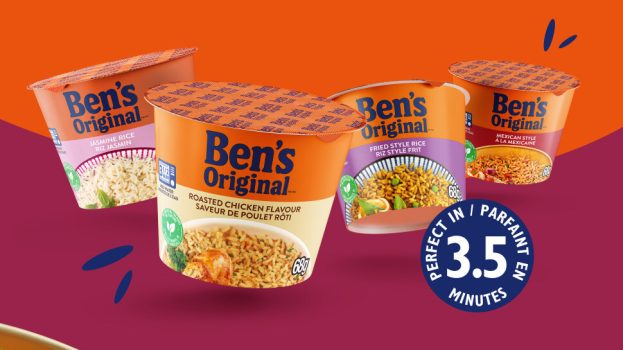A decade ago, shopping looked different for Canada’s vegans and vegetarians.
Veggie cuisine was limited largely to products from specialty stores rather than conventional grocers. Dairy-free alternatives were limited to a select few brands of soy milk and, in rare instances, packs of Daiya shredded “cheese”. Fast food chains rarely offered alternatives to beefy burgers and chicken sandwiches, and items were rarely promoted with much paid media.
Things have changed. Dairy-free milk now sits alongside its lactose-laden counterpart in supermarkets, with products made from soy, almonds, oats, coconut, cashews and peas. Plant-based food manufacturers such as Just and Impossible Foods have attracted hundreds of millions in investment. Yogurt giant Danone acquired dairy-free conglomerate WhiteWave, while Hellmann’s rolled out a vegan alternative to mayonnaise. A&W has partnered with Beyond Meat to bring vegan-friendly versions of its menu items to the masses.
The latest new Canadian launch is Kellogg’s MorningStar Farms. The vegetarian prepared food brand launched in the 1970s and was acquired by Kellogg in 1999.
Christine Jakovcic, VP of marketing for the Kellogg Canada, knows that the category looks different now than when MorningStar first hit the market years ago. For the most part, it’s positive.
“When we [Kellogg] have spoken to people, we’ve seen that the desire to eat plant-based alternatives has increased in the last four years by 45%, and 53% of the Canadians we speak to are already eating meat alternatives,” she tells strategy.
Notably, she says, the rise of the “flexitarian” movement is driving interest; people are experimenting with meatless meals and plant-based alternatives regularly without a dietary label. “People are recognizing that whether it’s for sustainability purposes or health, plant-based is just a better way to go, whether or not you put a label on yourself.”
With the recent update to Canada’s Food Guide encouraging people to eat less meat, and eliminating dairy as a necessary category, Jakovcic says this will only go up.
But the very thing that’s driving excitement in the category – high-quality innovations – is also posing a challenge in shopper marketing. Standing out is now more crucial than ever.
Jakovcic pointed to a growing divide within the market – while some products replicate meats in texture and appearance, MorningStar’s Canadian line of burgers are from what she calls the “veggie-forward” subsection of the category. The burgers show more morsels of the vegetables inside, such as black beans, tomatoes, bell peppers, chickpeas and herbs (MorningStar’s products more closely resembling meat remain south of the border).
While there are other brands within this sub-category, such as Wholly Veggie and Amy’s, Jakovcic says these are less common and less widely distributed than more blatant mock-meats (MorningStar will be in grocers such as Sobeys, Loblaw, Metro, Walmart, Costco and more).
MorningStar is embracing its difference, specifically when it comes to packaging. “People are very interested in transparency. They want to see vegetables in their burger.”
Indeed, the idea of knowing what goes into your food has been a major focus for all food and retail brands, from McDonald’s to U.K. retailer Sainsbury. To satiate that need for transparency, MorningStar’s packaging, made up of re-sealable bags in its signature green, will feature pictures of not only its burgers but also the various vegetables that go into them. In the coming weeks, it will also invest heavily in in-store sampling and education before engaging in any paid media.
Jakovcic also noted that MorningStar will be in the frozen aisle, contrasted with fridge brands such as Yves and Wholly Veggie. She says the placement emphasizes convenience, which hasn’t always been associated with plant-based eating. “You can pick a burger out of the freezer, cook it in a skillet, microwave, barbecue.”
But that’s not the only presumption changing. Sylvain Charlebois, a professor of food distribution at Dalhousie University, says everything is different. Besides the number of players in the category, he says quality is a bigger factor.
“Before, when companies put out a veggie burger, they were just checking off a box. But there was no emphasis on taste or quality. The Beyond Burger has really been a game-changer. People expect more.”
Interestingly, Charlebois’ research at Dalhousie shows that veganism isn’t necessarily on the rise. While there’s been little consistent tracking of vegetarians and vegans in Canada overtime, Charlebois says the estimates put them at just under half a million, along with more than two million vegetarians. But, he says, “There’s no major evidence that veganism is rising significantly.”
However, he says, interest in the category from people across all dietary labels has gone up. Google searches for the term “vegan” in Canada have increased nearly tenfold, and 24% of the cookbooks on Indigo’s bestsellers’ cookbook list are vegan or dairy-free.
Charlebois also credits the flexitarians of the world.
“Veganism is seen as incredibly restrictive, because it extends across your whole lifestyle. The companies are starting to really appeal to the flexitarians, and they will likely continue to in order to maintain momentum.”
Beyond Meat, which is not yet widely available for retail in Canada, has chosen a strategy in the U.S. with several grocery chains of situating its product alongside fresh hamburgers in the meat aisle – a place where Charlebois admits hardcore vegans might not even venture.
But he says this is a signal of where the category is likely to go.
“I believe that only a few years from now, the design of the grocery store will change based on how people are thinking about food. They’re not thinking about it in terms of ‘meat, veggies, dairy,’ they’re thinking of it in terms of ‘protein, calcium…’ I think in a few years, you won’t see the meat counter, you’ll see the ‘protein counter.’ You’ll see the biggest plant-based burgers right next to the beef burgers.”
























